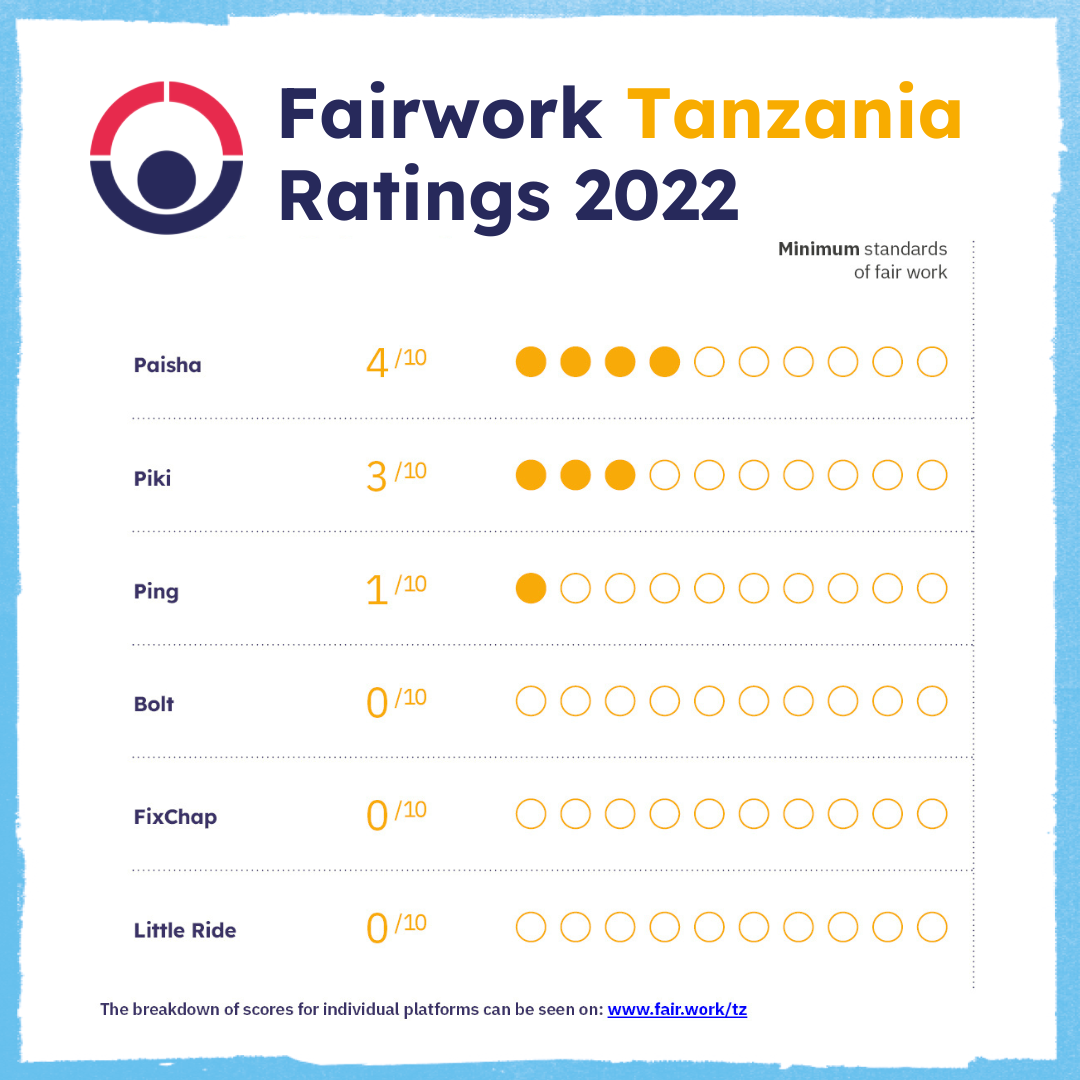Fairwork Tanzania releases first report, revealing best and worst practices in the platform economy

Thousands of people in Tanzania work in the platform economy, but Fairwork Tanzania’s new report – in partnership with REPOA – finds many of these workers face low pay and dangerous working conditions.
Some of the most popular platforms such as Bolt, Fixchap, Little Ride, Paisha, Piki, and Ping have been rated this year to examine how fairly they treat workers. Paisha and Piki topped the league table with a score of 4 and 3 respectively. The study found that most other companies, such as Bolt, Fixchap, Little Ride, and Ping, could not prove they meet minimum standards of fair work – such as ensuring all workers earn above the national minimum wage. This is the first study of its kind in Tanzania, scoring companies on labour standards such as pay, conditions, contracts, management, and representation.
REPOA’s Executive Director, Dr. Donald Mmari said: “For the first time we have looked at companies offering ride-hailing services, food delivery and artisan services to rate them on how they treat their workers. This provides a helpful guide for regulators and customers using these platforms. In this report, we found that Piki for instance offers its workers both minimum and living wages which is a step in the right direction for all platforms to emulate.”
Dr. Hilda Mwakatumbula, Senior Researcher at REPOA said: “As the platform economy is rapidly growing in Tanzania, it is high time the government developed policies and regulations that will lead to decent jobs for all.”
The report, ‘Fairwork Tanzania Ratings 2022: Towards Better Policies in the Platform Economy‘ ranks platforms against five principles of fair work, giving each company a score out of ten. The report finds that the majority of the platforms cannot evidence they meet the basic standards of fairness when benchmarked against the Fairwork principles. Following this study, researchers from REPOA are calling for stronger protections and more robust labour standards in Tanzania’s platform economy.
Professor Mark Graham, Professor of Internet Geography at Oxford Internet Institute and Director of Fairwork, said: “The low scores of many popular platforms in the Fairwork Tanzania league table demonstrates the need for regulatory intervention to ensure platform workers are no longer falling through the cracks. The need for regulation is further exacerbated by the COVID-19 pandemic. As part of our vision for a fairer future of work, we’re setting out a pathway to realize that ambition through the launch of the Fairwork Pledge. We urge organisations and investors to sign up to the pledge today and help our vision of fair work become a reality for all platform workers.”
Ratings
Key findings
Fair Pay: Only one out of six platforms could evidence that platform workers meet both the local minimum wage and the living wage in Tanzania.
Fair Conditions: Only one of the six platforms could evidence that there are adequate strategies that mitigate against all the risks that workers experience (first threshold). For the second threshold, none of the platforms could evidence that there are safety nets for workers, such as adequately compensating them for periods when they cannot work or earn due to sickness, accidents, or unforeseen circumstances.
Fair Contracts: Three of the six platforms could prove that they provide clear and transparent terms and conditions subject to the law of Tanzania (first threshold). However, for the second threshold, we could not evidence that any of the terms and conditions on the six platforms do not exclude liability or prevent workers from seeking redress for grievances arising out of their work.
Fair Management: While all platforms possess communication channels via the app, mobile, and social network chats, none of the six platforms could evidence that there is a fair due process for decisions affecting workers.
Fair Representation: While there are growing worker collective bodies such as the Tanzania Online Drivers Association (TODA), we only found evidence for one of the six platforms that assures freedom of association and ensures the expression of collective worker voice. Only one platform could evidence that it supports democratic governance, i.e., that workers can contribute meaningfully to the everyday decisions affecting the labour process.
What can I do? Fairwork Pledge
As part of Fairwork’s commitment to making platforms accountable for their labour practices, we have launched the Fairwork Pledge. This pledge aims to encourage other organisations to support decent labour practices in the platform economy, guided by the five principles of fair work.
Organisations like universities, schools, businesses, investors and charities that make use of platform labour can make a difference by supporting platforms that offer better working conditions.
Organisations have the option to sign up to the Pledge as an official Fairwork Supporter or an official Fairwork Partner. Those signing up to be a Supporter must demonstrate their support for fairer platform work publicly and provide their staff with appropriate resources to make informed decisions about what platforms to use. Becoming a Fairwork Partner entails making a public commitment to implement changes in their own internal practices, such as committing to using better-rated platforms when there is a choice.
The Oxford Internet Institute, The University of Oxford School of Geography and the Environment, The Church of England Diocese of Oxford, the Good Business Charter, The New Economics Foundation and Meatspace Press have already signed the pledge. Join them in demanding a fairer future of work!
